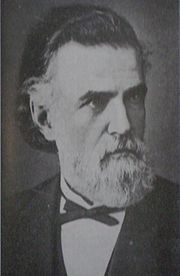Carlos Tejedor (politician)
| Carlos Tejedor | |
|---|---|
 |
|
|
National Deputy for Buenos Aires |
|
|
In office 1898 — 1902 |
|
| Governor of Buenos Aires | |
|
In office 1878 — 1880 |
|
| Preceded by | Carlos Casares |
| Succeeded by | José María Moreno |
| National Deputy for Buenos Aires Province |
|
|
In office 1874 1866 — 1869 |
|
| Minister of Foreign Relations | |
|
In office 1870 — 1874 |
|
| Preceded by | Mariano Varela |
| Succeeded by | Pedro A. Pardo |
| Attorney General of Argentina | |
|
In office 1875 - 1878 |
|
| Preceded by | Francisco Pico |
| Succeeded by | Eduardo Costa |
| Personal details | |
| Born | November 4, 1817 Buenos Aires |
| Died | January 3, 1903 (aged 85) |
| Spouse(s) | Etelvina Ocampo |
Carlos Tejedor (November 4, 1817 — January 3, 1903) was an Argentine jurist and politician, Governor of Buenos Aires Province between 1878 and 1880. Tejedor was a prominent figure in the movement against the Federalization of Buenos Aires.
Tejedor born in Buenos Aires to Antonia Carrero and Antonio Tejedor, in 1817. He enrolled at the University of Buenos Aires, where he earned a law degree in 1837, and married Etelvina Ocampo. He became a prominent supporter of the interests of Buenos Aires, and joined Ramón Maza in an 1839 plot against Governor Juan Manuel de Rosas. The group protested what they saw as too many concessions on the part of Rosas toward other provincial Caudillos in order to buttress the fragile Argentine Confederation. Following Maza's execution, however, Tejedor joined Unitarian Party leader General Juan Lavalle, and fled to Chile, where he resumed his law practice and became a friend and ally of future Chilean President Manuel Montt.
He returned to Buenos Aires following Rosas' overthrow after the Battle of Caseros of 1852, and became a central figure in the movement led by Valentín Alsina against the Federalization of Buenos Aires as the national capital through his position of editor-in-chief of El Nacional. He opposed the San Nicolás Agreement, Entre Ríos leader Justo José de Urquiza's bid for national unity, and plotted the assassination of Urquiza with the Logia Juan-Juan. The attempt on Urquiza a failure, a revolt erupted in Buenos Aires on September 11, 1852, and the latter province became independent of the Confederation for the remainder of the decade. Tejedor then collaborated with Dalmacio Vélez Sarsfield in the drafting of a Provincial Constitution for Buenos Aires, the following year.
...
Wikipedia
